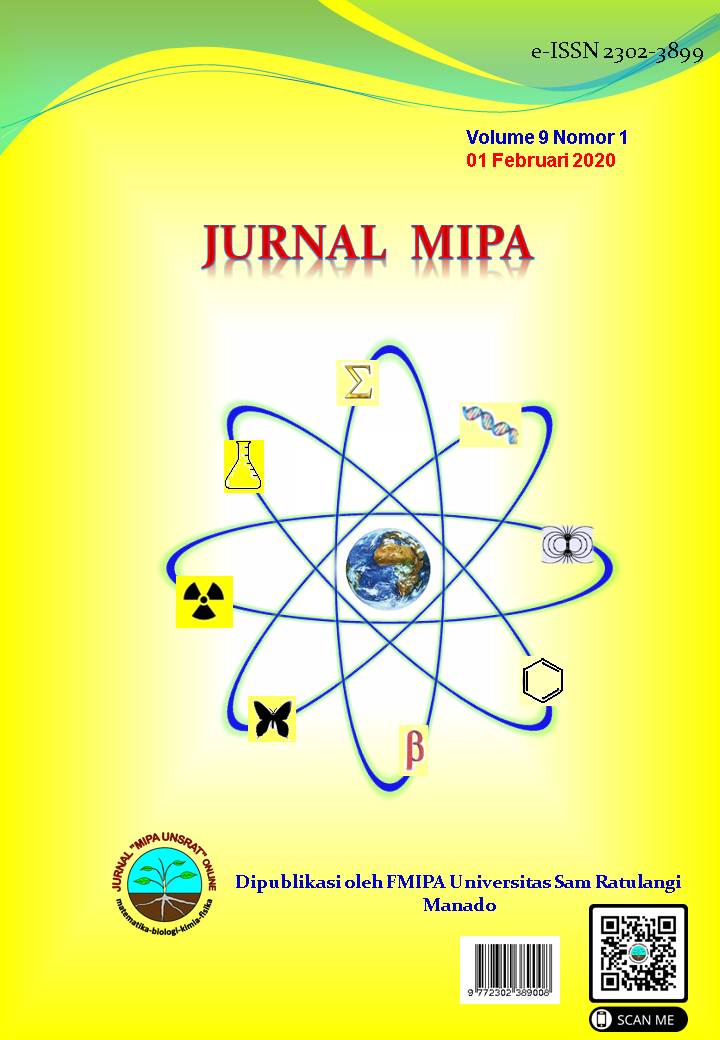Penerapan Metode Transesterifikasi Subkritis Mendekati Isokorik dalam Pembuatan Biodiesel
DOI:
https://doi.org/10.35799/jmuo.9.1.2020.27081Keywords:
Biodiesel, Yield, GCMS, Subcritical, Isochoric, Coconut oil, Palm oilAbstract
Penelitian ini bertujuan untuk membuat biodiesel dengan bahan baku minyak kelapa dan minyak sawit dengan mencampurkan metanol sebagai pelarut dan KOH (kalium hidroksida) sebagai katalis. Proses transesteriï¬kasi berarti mengambil molekul trigliserida atau asam lemak kompleks, menetralkan asam lemak bebas dengan menambahkan metil alkohol menjadi metil ester. Tahapan pertama yaitu membuat biodiesel dengan volume keseluruhan campuran bahan baku, pelarut dan katalis yaitu 575 ml dan 550 ml dengan tekanan maksimum 15 bar dan suhu maksimum 150oC selama satu jam. Tahapan berikutnya menghitung yield yang diperoleh dari biodiesel yang dihasilkan kemudian dilakukan uji Gas Chromatography Mass Spectrometry dan selanjutnya dilakukan uji parameter bahan bakar. Hasil menunjukkan biodiesel dari minyak kelapa memperoleh yield 98,82% lebih besar daripada minyak sawit yang hanya memperoleh yield 92,38%, dan ditemukan komposisi C terbesar pada biodiesel dari minyak kelapa dengan volume keseluruhan campuran bahan 575 ml yaitu C15H30O2 dengan luas area 27.10% sedangkan komposisi terbesar untuk biodiesel dengan volume keseluruhan campuran bahan 550 ml adalah C15H30O2 dengan luas area 24.04%. Untuk biodiesel dari minyak sawit komposisi C terbesar yang terbentuk pada volume keseluruhan campuran bahan 575 ml yaitu C19H36O2 dengan luas area 40.95% dan untuk volume keseluruhan campuran bahan 550 ml komposisi terbesar C19H36O2 dengan luas area 40.88%.
This study aims to make biodiesel with raw materials of coconut oil and palm oil by mixing methanol as a solvent and KOH (kalium hydroxide) as a catalyst. The process of transesterification means taking triglyceride molecules or complex fatty acids, neutralizing free fatty acids by adding methyl alcohol to methyl esters. The first stage is making biodiesel with an overall volume of a mixture of raw materials, solvents and catalysts of 575 ml and 550 ml with a maximum pressure of 15 bar and a maximum temperature of 150oC for one hour. The next stage is calculating the yield obtained from the biodiesel produced then the Gas Chromatography Mass Spectrometry test and then to test the fuel parameters. The results show biodiesel from coconut oil yields 98.82% greater than palm oil which only yields 92.38% yield, and found the largest composition of C in biodiesel from coconut oil with a total volume of 575 ml mixture material, namely C15H30O2 with an area of 27.10% while the largest composition for biodiesel with an overall volume of a mixture of 550 ml material is C15H30O2 with an area of 24.04%. For biodiesel from composition C largest palm oil that is formed in the overall volume of the mixture of 575 ml, namely C19H36O2 with an area of 40.95% and for the overall volume of the mixture of 550 ml the largest composition of C19H36O2 with an area of 40.88%.






